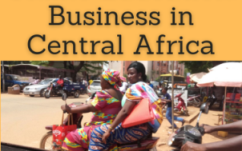Business in Cameroon. Cameroonian Economy
Cameroon: 40% of CEMAC GDP. Yaoundé, Douala (Foreign Trade, Logistics)
Cameroon: 40% of CEMAC GDP
- The Cameroonian economy is based on primary sector (42% of GDP)
- Main revenue sources of Cameroon: agriculture, livestock, fisheries, forestry, mining, and industry

- Introduction to the Republic of Cameroon (Central Africa)
- Cameroonian Economy
- International Trade of Cameroon
- Business and Investment Opportunities in Cameroon
- Agriculture and agribusiness sector
- Housing and construction sector
- Business services in Cameroon
- Mining sector
- Tourism
- Cameroon Investment promotion Agency (CIPA)
- Case Study:
- Cameroon Telecommunications
- How to invest in Cameroon
- Cameroon Breweries
- Fadil Group
- Access to the Cameroonian Market
- Business Plan for Cameroon
Sample: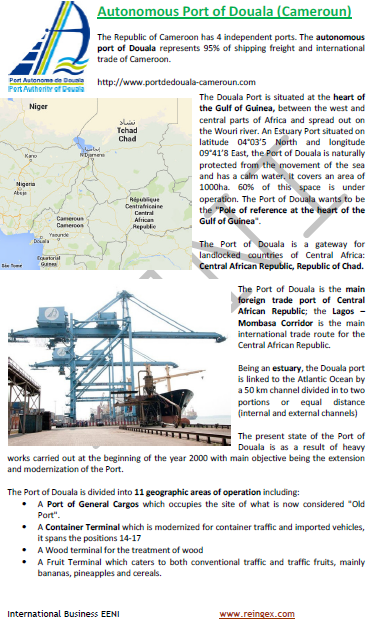

- To analyze the Cameroonian Economy, Logistics and Global Trade
- To conduct research on business opportunities in Cameroon
- To explore the Cameroonian trade relations with the student's country
- To learn about Cameroonian Trade Agreements
- To examine the profile of the Cameroonian companies
- To develop a business plan for the Cameroonian Market

The Subject “Foreign Trade, Logistics and Business in Cameroon” is included within the curriculum of the following academic programs at EENI Global Business School:
Doctorate in African Business.

Master in Business in Africa, International Business.

Masters adapted to  Cameroonian Students.
Cameroonian Students.
Languages:  or
or  Cameroun
Cameroun  Camarões
Camarões  Camerún.
Camerún.
- Subject Credits “Doing Business in Cameroon”: 2

International Trade, Logistics and Business in Cameroon.

- Port of Douala
- Trans-African Transport Corridors related to Cameroon:
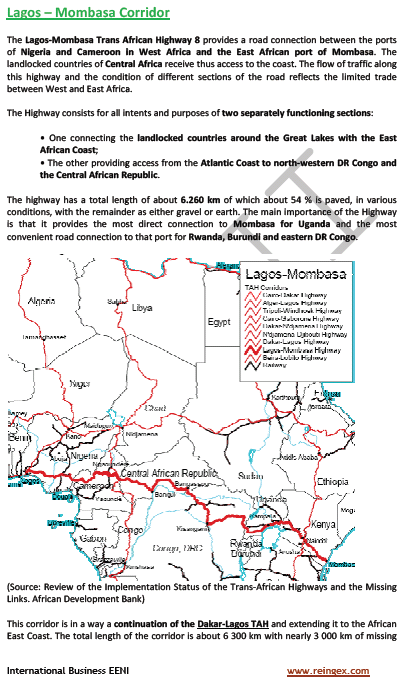


Cameroonian Preferential Access and Trade Agreements:
- Cameroon and the Central African Economic Area
- Central African Economic and Monetary Community (CEMAC)
- Economic Community of Central African States (ECCAS)
- African Continental Free Trade Area
- AGOA (U.S.)
- Trade Agreements with Egypt, South Africa, Switzerland, China, Russia, India
- Africa-EU Partnership
- Niger Basin Authority
- Harmonization of Business Law in Africa (OHADA)
- Global System of Trade Preferences
- UK-Cameroon Agreement

- World Trade Organization (WTO)
- Agreement on Trade in Services (GATS)
- Agreement on the Application of Sanitary Measures
- Agreement on Technical Barriers to Trade
- Agreement on Preshipment Inspection
- Agreement on Safeguards
- Trade Facilitation Agreement
- World Customs Organization (WCO)
- Kyoto Convention (Containers)
- BIC (Containers)
- Chicago Convention (ICAO)
- International Maritime Organization
- Hamburg Rules (Sea)
- Rotterdam Rules

- Economic Commission for Africa
- African Union
- AU Convention on Preventing and Combating Corruption (not signed)
- AUDA-NEPAD
- African Development Bank
- Africa-Asia Partnership
- China-Africa Cooperation
- Africa-India Cooperation
- Africa-BRICS
- Africa-Turkey Partnership
- Africa-South America Summit

- Islamic Development Bank
- Organization of Islamic Cooperation (OIC)
- Afro-Arab Cooperation
- Arab Bank for Africa (BADEA)

- Commonwealth (since November 1995)
- United Nations
- World Bank
- World Trade Organization (WTO)
- International Monetary Fund
The Republic of Cameroon is situated in Central Africa, sharing borders with Chad, the Central African Republic, Congo, Gabon, Equatorial Guinea, and Nigeria.
- The Republic of Cameroon has an area of 475,440 km² and a population of 24 million people
- Cameroonian Languages: French (80% of the Cameroonian population) and English (20%)
- Cameroonian Independence: 1960 (France)
- Cameroonian Capital: Yaoundé (2.5 million people)
- Douala is the largest city: 3 million people, Port of Douala
- Largest cities: Bafoussam, Garoua, Ngaoundéré, Bamenda, and Marua
More information about Cameroon (EENI African Business Portal).
Main religion in Cameroon.
- African Traditional Religions
- Christianity
- Catholicism (4 million)
- Protestants (3 million, 27% of the Cameroonian population)
- Islam (mainly in Northern regions)


Cameroonian Economy:
- Fighting against corruption and poverty is a preference for the Government of the Republic of Cameroon
- The Cameroonian agriculture is the main sector of the Republic of Cameroon, employs 70% of the workforce and contributes 42% to the GDP formation of Cameroon
- Main cash crops of Cameroon: cocoa, coffee, cotton, bananas, rubber, potato, and pepper
- Cameroon represents 40% of CEMAC GDP and 39% of total CEMAC exports
- Most dynamic economic sectors in Cameroon: trade, construction, agriculture, manufacturing, and extractive industries (petrol and gas)
- Cameroonian currency: CFA FRANC
- The objective of the National Investment Corporation of Cameroon is to mobilize and focus on national savings
International Trade and Business in Cameroon:
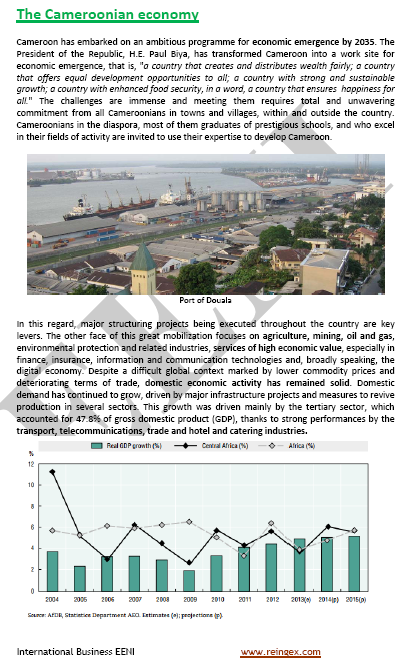
The Republic of Cameroon has four independent ports. The Autonomous Port of Douala represents 95% of Shipping freight and International Trade of Cameroon.
The telecommunications sector develops very quickly in Cameroon. The Cameroon Telecommunications is a public company owned 100% by the State of Cameroon. Created in 1998, Cameroon Telecommunications (CAMTEL) is strongly implicated in the development and modernization of telecommunications markets in Cameroon. CAMTEL just signed an agreement with a Chinese company.
Brasseries du Cameroon (Cameroon breweries) is a food processing company specialising in soft drinks manufacture and distribution. The company is the leading industry in Cameroon. Created in Douala (Cameroon) in 1948, became an affiliated company of the Castel Group in 1990.
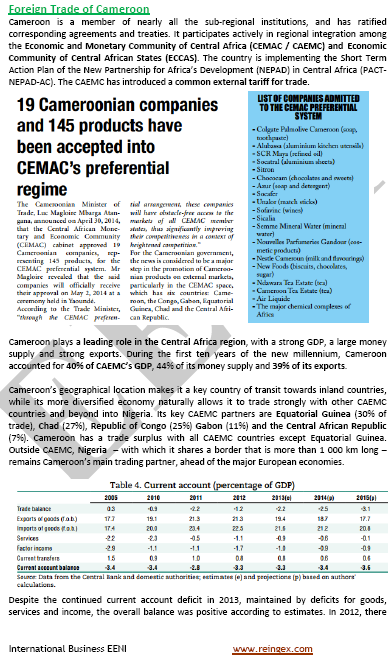
(c) EENI Global Business School (1995-2025)
Top of this page








 WhatsApp
WhatsApp